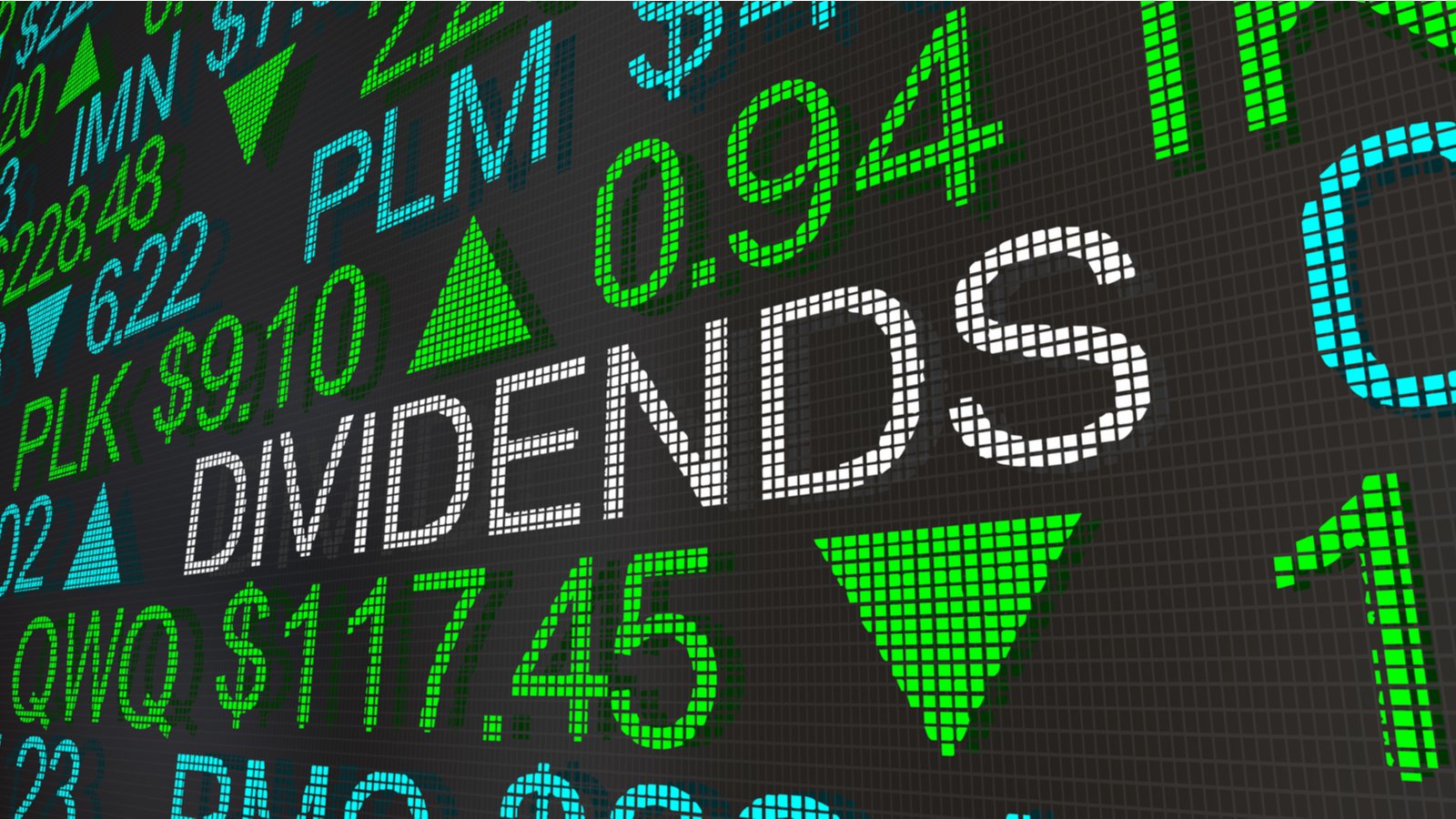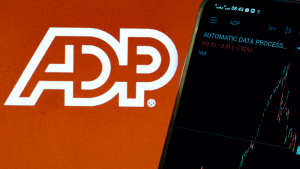
When it comes to the best dividend stocks in the S&P 500, Dividend Aristocrats may first come to mind. As you may know, Dividend Aristocrats are S&P 500 stocks with a 25-year or longer track record of annual dividend increases.
While those stocks represent many of the best dividend stocks to buy and hold, many other non-aristocratic S&P 500 components are worth a closer look due to their merits as long-term dividend stocks.
Weighing all factors (not just dividend yield), a few names stand out in terms of both the dependability and consistency of payouts, as well as their dividend growth track records.
With all of this in mind, let’s take a look at these seven best dividend stocks in the S&P 500 to buy this month. Consider each aristocrat and non-aristocrat a worthwhile buy at current prices.
Automatic Data Processing (ADP)

I laud shares in payroll and HR services firm Automatic Data Processing (NASDAQ:ADP) quite often in my coverage of top dividend stocks. For example, back in February, I included it on a list of stocks with ironclad dividend payouts.
However, it’s not only Dividend Aristocrat status (signaling payout consistency) that makes ADP stock one of the top dividend stocks. The company has also increased its payouts by a double-digit amount (12.36%) each year, on average, over the past 5 years. Other aristocrats raise their payouts by just a few percentage points each year.
While ADP’s payout ratio (nearly 60%) may seem a tad high, as forecasts call for 9-10% earnings growth in the coming years, further steady increases to this dividend, not to mention further steady price appreciation for shares, appear within reach. At current prices, Automatic Data Processing stock has a forward dividend yield of 2.3%.
Broadcom (AVGO)

Besides being perhaps one of the top tech stocks, growth stocks and AI stocks, did you know Broadcom (NASDAQ:AVGO) is arguably one of the best dividend stocks in the S&P 500? That’s based on how shares in this leading purveyor of semiconductors and infrastructure software stack up based on the aforementioned dividend stock criteria.
AVGO stock is about halfway towards becoming a dividend aristocrat (13 years of consecutive annual dividend increases). The company has also increased its payout by an average of 19.25% annually over the past five years.
While not certain, more double-digit annual increases may lie ahead. Between Broadcom’s success capitalizing on the AI chips trend, as well as from the cost/growth synergies stemming from last year’s merger with VMWare, much suggests sufficient continued earnings growth to fund such increases. At current prices, AVGO has a forward dividend yield of 1.6%.
CSX (CSX)

Jacksonville, Florida-based CSX (NASDAQ:CSX) is one of six class-one freight railroads in the United States. As an operator in this oligopoly, providing an essential service that sustains national and global commerce, this company has high margins, consistent profitability and a deep economic moat.
With all of this, it’s not a surprise that CSX stock ranks well among S&P 500 dividend stocks. With 19 years of consecutive dividend growth under its belt, CSX’s dividend has increased by an average of 8.45% annually over the past five years.
The most recent increase was enacted last month when the company raised its quarterly payout from 11 to 12 cents per share, or around a 9.1% increase. Alongside this dividend, CSX also returns capital to shareholders through stock buybacks. In 2022 and 2023, the railroad made share repurchases of $4.7 billion and $3.5 billion, respectively.
L3Harris Technologies (LHX)

L3Harris Technologies (NYSE:LHX) is another of the best dividend stocks in S&P 500 that I have discussed in glowing terms in prior dividend stock articles. As I have pointed out before, this defense firm has increased dividend payouts 22 years in a row. Shares currently have a forward yield of 2.16%.
If dividend increases continue, LHX stock will become a Dividend Aristocrat within the next few years. Further increases appear likely, given forecasts calling for strong earnings growth during this time frame. Chalk up these solid prospects to both increased geopolitical tensions, plus L3’s success at making “bolt-on” acquisitions of smaller companies in its industry.
Trading for around 16.8 times forward earnings today, achieving aristocrat status could help LHX bridge the valuation gap between it and rivals that already are aristocrats, like General Dynamics (NYSE:GD), which trades for 18.7 times forward earnings.
Parker-Hannafin (PH)

Cleveland, Ohio-based Parker-Hannafin (NYSE:PH) is a manufacturer of motion and control technology systems. This industrial stock currently has a moderate-to-low forward dividend yield (1.1%), but keep in mind this dividend could increase substantially over time, as the company’s dividend growth track suggests.
Parker-Hannafin payouts have increased by an average of 14.26% annually over the past five years. Furthermore, not only is PH stock a Dividend Aristocrat, it’s a Dividend King as well. In fact, with 67 years of consecutive dividend growth, Parker-Hannafin has long since passed the king threshold of 50 years.
Even after big dividend increases in recent years, PH still sports a relatively low payout ratio (23.92%). Coupled with the prospect of high single-digit/low double-digit earnings growth in the coming years — based on sell-side forecasts — there’s a good chance that above-average levels of payout increase will continue in the years ahead.
Starbucks (SBUX)

Ask someone which restaurant stock is among the best dividend stocks in S&P 500, and the first answer may be McDonald’s (NYSE:MCD). However, instead of owning the golden arches, dividend investors may want to opt for Starbucks (NASDAQ:SBUX) instead.
Why? In terms of dividend yield, SBUX stock (2.5% forward yield) only marginally beats out MCD stock (2.28%) in this category. While Starbucks is on its way to becoming a Dividend Aristocrat (with 13 years of consecutive payout increases), MCD earned its regal title decades ago.
However, while MCD has increased its payout over the past five years by an average of around 8% annually, SBUX’s payout has gone by an average of 9.78% by this same metric. Most importantly, while trading at similar forward multiples, Starbucks’ expected future earnings growth exceeds that of McDonald’s, suggesting stronger long-term upside potential for shares.
UnitedHealth Group (UNH)

Growth at a reasonable price (GARP) is an apt descriptor for UnitedHealth Group (NYSE:UNH) shares. The health insurance and services giant trades for only 17.1 times forward earnings. That’s a low valuation, given how UNH has continued to increase earnings by double-digits each year.
Granted, a big reason why you can pick up UNH stock at a reasonable price today has to do with recent negative developments—namely, an antitrust probe and a ransomware attack. However, once headwinds resolve, shares could bounce back to their historic valuation — 20 to 25 times forward earnings.
That’s not all. The fact UnitedHealth is using its earnings growth to ramp up its dividend also bodes well for long-term investors. While its 1.58% yield is tiny today, with payouts increasing by 15.87% on average over the past five years, these payouts could become an even greater contributor to total returns in time.
On the date of publication, Thomas Niel did not hold (either directly or indirectly) any positions in the securities mentioned in this article. The opinions expressed in this article are those of the writer, subject to the InvestorPlace.com Publishing Guidelines.




